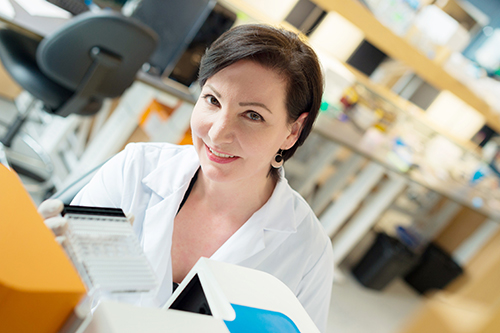In late March, Zee Rahiman spiked a fever and could barely talk because of non-stop coughing and vomiting. Once admitted to hospital, his condition rapidly deteriorated. Zee tested positive for COVID-19 and was transferred to the intensive care unit (ICU), where he was placed on a ventilator.
“I initially thought ‘I’m fit. This is going to be another flu for me,’” says Zee, 32. “But I found out that my immune system was not as talented as I thought.”
As Zee lay unconscious and intubated in ICU, a physician asked his mother for permission to treat him with an immunosuppressant as part of a new collaborative study led by the University of British Columbia (UBC) and Vancouver General Hospital (VGH).
Knowing Zee’s life was in the balance, his mother agreed. The results were remarkable, and after four days, Zee was moved out of ICU to recover.
The research collaboration, co-led by Dr. Myp Sekhon, a clinical assistant professor in UBC’s department of medicine and intensive care physician in the ICU at VGH and Dr. Cheryl Wellington, a professor in UBC’s department of pathology and laboratory medicine, was examining how the immune system can overreact in the presence of COVID-19 and attack the lungs.
Quick work in the lab saved lives in hospital

Dr. Cheryl Wellington
Before the COVID-19 pandemic was declared, Drs. Sekhon and Wellington were working together on a study of the neurological complications of heart attacks. Thanks to the research techniques and technology they were already using, they quickly shifted their work in response to the global emergency, developed a new project within two days and received full Research Ethics BC and biosafety approvals within a week.
Initial tests performed in Dr. Wellington’s laboratory at the Djavad Mowafaghian Centre for Brain Health indicated COVID-19 patients had elevated presence of inflammatory and immune biomarkers—a substance in the blood that indicates specific biological processes—which led them to investigate the possibility of using existing immune suppressant medication.
The research team worked around the clock, completing analyses within 48 hours, where a patient study would usually take between four and six months.
“There was exhilaration, elation that we were really onto something as we saw the data unfold into a clear picture,” says research associate Dr. Sophie Stukas.
“Jumping on this project was so exciting and fulfilling,” says Dr. Ryan Hoiland, another member of Dr. Sekhon’s team. “We’ve positioned ourselves to have some legitimate impact.”
Vancouver Coastal Health predicts 60 per cent of COVID-19 patients in British Columbia will be treated at VGH and Surrey Memorial, which gives the team a significant opportunity to discover more about how the body’s immune system reacts to the disease.
“As a scientist, being able to help the clinicians and be a member of a large interdisciplinary team that is doing work to an exceptional standard has been the most meaningful period of my professional life. It’s a fantastic feeling to be able to contribute and bring in my team to be a part of this.” – Dr. Cheryl Wellington
The peer-reviewed study was published in the British Journal of Hematology in June 2020, with six more papers featured in other prestigious publications. This body of work includes research into the connections between inflammation and lung function, neurological aspects of COVID-19, and how ABO blood group influences disease course.
A basis for a provincial biobank
Early in the pandemic, the research team had ethics approval in place to collect samples from ICU patients with COVID-19, building a comprehensive biobank of critically ill COVID-19 patients in B.C. Samples from second wave patients are still being added to the biobank, which has more than 700 specimens from at least 58 COVID-19 patients.
A province-wide biobank will bring together the individual efforts of teams like Dr. Sekhon’s and Dr. Wellington’s who are working to understand the effects of SARS-CoV-2 on the body to discover new treatments. Existing within the network of major hospitals in B.C., the provincial biobank will create a centralized collection of readily available tissue samples, accelerating the translation of research to effective therapies and informing population-level research to stay ahead of future outbreaks.
“UBC is well-positioned to lead the way in Canada because we have been collecting samples and building our biobank since late March 2020 and have already proven its value through the knowledge gained in research studies,” says Dr. Wellington. “Many investigators are now requesting samples from our biobank for new studies, again demonstrating its value to learn more about the nuances of COVID-19.”